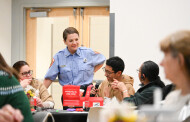Luke Beasley stood among his co-workers behind the Apex Electric Utilities building and put on his gear including a body belt, yellow hardhat, thick gloves and climbers. Attached to the belt was a special safety device called a fall arrest, which he wrapped around a 40-foot pole and then scurried up in a flash, piercing the wood as he went with the sharp gaff on each climber.
Gaff holes run up and down the pole just like others in the training yard, all signs of repeated climbing practice by the professionals who help keep the lights on for the town. This dedicated and hardworking group are linemen, also called lineworkers, and Beasley is among them.
He’s fairly new to the Apex crew and is at the apprentice level, specifically an electric line technician apprentice. With more time and training he hopes to advance to the experience and skill level of the other men gathered outside — Lincoln Denning, a journeyman lineworker; Jon Rose and Dustin Prince, electric field supervisors; and Ken Weatherman, the electric operations manager.
As Beasley climbed, the other men watched from the ground and offered suggestions to improve his method for competition. This past spring, Beasley was part of a special kind of rodeo that focuses on precision competitions related to utility line work and he plans to do so again in 2025.
The Lineman’s Rodeo is hosted by the North Carolina Association of Municipal Electric Systems (NCAMES) as part of its annual conference. The Apex lineworkers have a tradition of doing well at the state competition, often advancing to and placing at nationals, as well.
Impressive trophies, some stretching several feet tall, and shiny plaques fill a display case inside the department’s building on Milano Avenue. There are also pictures of individual lineworkers, including Weatherman, Denning, Rose and Prince, that hang in the trophy case with accolades listed below their names, such as first place overall, second place overall, and so on. The wins trace back to 2003 when the department first started competing.
“It hones your skills for sure,” said Weatherman. The competitions feature a series of physical events and a written test for both the apprentice and journeyman divisions. Rodeo participants have to compete in every event for their division level.
The events are designed to simulate real-life situations and the skills necessary to handle them effectively and safely. Specifically, the judges are looking at safety procedures, work practices, equipment handling and timely completion of an event, according to NCAMES information.
Every event is performed as if in a real-life situation with an electrified line, although nothing is actually electrified in the competition. For example, the “hurtman rescue” event simulates a fellow lineworker being unconscious approximately five feet from the top of a 40-foot pole who then has to be brought to the ground following specific guidelines. The pretend co-worker in need of rescue is a mannequin secured to the pole.
Points are deducted during events for violating safety requirements and not following correct procedures, such as dropping a tool or not wearing all the proper equipment. And, since it’s a competition, completing tasks quickly and within a certain time limit is added into the equation.
Beasley, who won his rodeo competition at Nash Community College where he graduated from the Electric Line Construction Technology program, was unhappy with his performance at the NCAMES rodeo. He placed 15th out of 50 competitors and is looking forward to trying again this spring.
His co-workers ribbed him about the school win. They laughed and joked about seeing proof like a good-natured group of brothers or a sports team. “Where’s the trophy?” the guys playfully asked as Beasley smiled and laughed, too, before continuing to talk about the rodeo experience.
“Times weren’t as good as practice,” he said. “We spent a lot of time practicing it to begin with but that’s extra [practice] because of what you do at work. [The judges] are not just looking at your time because you could do it really fast, but you could do it badly or unsafely. For example, for me, I was doing my hurtman rescue and I had a specific set-up on my belt. My knife was on a lanyard, but it had come out of the bag, and it was just hanging on the lanyard.
“That can be seen as something that’s potentially hazardous for myself and what I’m performing, so they are going to knock a point off for that,” he said, adding that slipping on the pole, using the wrong technique, dropping a nut or a bolt are all examples of additional things that can result in point deductions.
Denning agreed the competitions help hone your skills and keep you proficient in your climbing, plus it feels good to win.
“It’s kind of bragging rights a little bit,” he said. “It’s kind of like our time to go and show what we can do.”
Denning also said it’s exciting and fun to compete, otherwise it’s like members of a sports team that work together on their skills all the time, but then never have a game.
Rose added that the wins go beyond a personal achievement for himself and his co-workers. “We like to represent Apex,” he said.
Weatherman noted that professional pride like Rose’s is a shared sentiment throughout the department and the industry.
“Public power linemen take an enormous amount of pride in their work and are very proud to call themselves, ‘Linemen,’” he said. “Not a lot of people can, or are willing to, do this type of work.
“It takes someone with a lot of confidence, skill and nerve to work on something that can kill you in an instant from one small mistake. We are a dedicated group of people who work diligently as a team every day to keep the lights on in Apex — and love every minute of it.”
Prince agreed. “We all love what we do. That’s why we do it.”
The job of a lineworker is dangerous and, thankfully, today there is a wealth of knowledge available and safety procedures in place. There was a time, however, when this was not the case.
“Before electricity started, they had telegraph linemen,” Weatherman explained. “Once power was introduced, they took lineworkers from those telegraph systems and the phones and basically taught them how to be electric line workers. Not very much was known about power back then so people were getting killed left and right.”
Since lineworkers risk their lives so we can throw a switch and have light, they must go through a great deal of training and continuing education throughout their careers.
Lineworkers start at the apprentice level and strive to reach journeyman, the highest level. To reach this level, lineworkers go through a career development program that takes about 4-4.5 years. The program’s extensive, ongoing training and testing includes 8,000 hours working in the field under the supervision of an experienced journeyman. Additional training is required to advance to supervisory and management roles, such as those held by Rose, Prince and Weatherman.
“Basically, the ultimate goal in a lineworker’s career is to get that certificate through the state that says, ‘I am a qualified journeyman lineworker,’” said Weatherman.
“It’s very dangerous and there are so many aspects to linework. You have to know about substations and how they function without blowing something up and ourselves. You have to do the overhead portions — all of our feeders are overhead, which means they’re on poles and then they dip down underground, like in a subdivision, so we have to know about the underground portions. We need to know about metering, how to hook up all our transformers, banking — there’s just so much. Very complicated, and to become an expert on it takes more than four years.”
Weatherman added that continuous learning is shared across all job levels. “Our supervisors know the best way to retain the information and experience they have is to teach someone else,” he said. “We are constantly reviewing procedures and sharing experiences with each other and other towns. We are all constantly learning.”
Apex currently has 22 lineworkers on staff. As an independent, community-owned utility, the town buys its electricity from Duke Power and then handles and maintains the distribution of that power to customers within the Apex town limits, parts of Cary and some rural areas. Apex has owned and operated its own electric distribution system since 1917, according to the town’s website.
The Apex system has three substations and a total of 18 distribution feeder lines, six leading from each substation. According to the online information, the Apex team maintains approximately 735 miles of underground lines, 161 miles of lines overhead and 7,500 streetlights. In addition to the lineworkers, the electric utilities department includes arborists, technical services employees and administrative staff.
“That’s what these guys do,” said Weatherman of the lineworkers. “They take care of that system. They care for that whole system, underground, overhead, all of that.”
Unlike the rodeo competitions, this work is usually done while the lines are electrified to avoid power disruptions for customers.
“We do everything — overhead, underground — and do it mostly energized, so whenever you see those orange hoses and stuff on the lines, we are working on energized conductors,” Weatherman explained. The hoses are used to insulate the lines and to protect against incidental contact.
The fact that the department does the majority of its work with energized lines is something Weatherman believes would surprise most customers.
“Our number one priority is our safety,” he said. “We have a very good safety record and we’re willing to inconvenience our customers for our safety. Everything is done energized if it can be done safely. And, I would say that 99% of our work is done energized.
“That’s one thing customers don’t really realize. We can get a new pole in, transfer the line, parallel services and get out of there and residents don’t even know we were there. They come home and notice ‘Hey, I have a new pole.’ They go into their house, and they don’t have to reset the clocks.”
One thing is clear when talking with the town’s electric utilities staff: they take great pride in their job and helping Apex residents, which is why they are ready to go when challenging situations such as thunderstorms and hurricanes roll in.
“When the power is out and the stuff is hitting the fan, everybody’s got their Spidey sense up and they are trying to get [the power] back on, but a lot of times you’ve got to pull back,” said Eric Neumann, the department director.
“It’s difficult, especially for these guys, who are so attuned to going up there and fixing it. They’re staring at it and saying, ‘If I can get up there, I can put it back right now,’ and then realizing that it is not a safe environment to do that and holding them back.”
Rose agreed that it’s frustrating to wait out a storm. “If I’m on call, I can’t sit still while the power is out. It’s hard to do that.”
He recalled working during a hurricane and being able to stay ahead of things by resolving small outages here and there, but then the poles started snapping and they had to pull back.
The feelings shared among the Apex crew are common for lineworkers, according to Weatherman. “It’s a reflection on us. I think it’s just engrained in all of us — we need to get that power back on.”
The Apex lineworkers discussed the misconceptions they hear from the general public about their job and the power supply. This includes everything from believing an underground system in a neighborhood can’t go out to the fact that restoring power isn’t a simple push of a button or turn of a switch. And just because television news crews can set up outside and broadcast during a storm doesn’t mean the lineworkers can do their jobs safely in the same conditions.
Neumann explained that high winds, trees falling, lack of night-time visibility are all factors that impact when crews can work.
Lineworkers don’t stay overnight at their department building when on duty as other professions do, such as firefighters. The exception is when a major storm comes and the lineworkers stay on site, sleeping on cots and working in shifts. In those situations, it may also be necessary to bring in outside contract crews to assist, which requires extensive planning and providing everything from housing to food.
“When you get into those multiple day storms it usually takes a while to understand the complexity of the storm you are dealing with,” Neumann said. “If we end up with 100 busted poles, we need to get outside resources, and if we’re bringing in outside resources, how many resources do we need here to manage them? They don’t just show up and do work.”
Just like outside crews come to Apex to help in an emergency, some of the Apex lineworkers have done the same to help other communities during their careers. Prince recalled traveling to areas such as Florida and Louisiana to work where storm devastation was so extensive it limited what could be achieved during his time there.
“You’ve got to look at these folks and you’ve got their whole neighborhood,” he said and paused for a moment. “There may be 150 houses in there, and you look and say, ‘Well, I can’t. There’s too much devastation.’ So, now they’re going to be out for who knows how long. And you’ve got to leave from that place knowing we worked four days to get two houses on. It felt like it could have been a whole lot more, but there’s so much damage.”
Knowing people are suffering and you can’t do more — “That’s the worst part of the job,” he said.
Dealing with a major storm can bring a mental strain, even here at home, according to the lineworkers who cited long hours in challenging weather conditions, trying to help their own families between shifts and worrying about their families when not with them.
“What a lot of people don’t realize is the mental side of that,” Prince explained. “You’re out here trying to get power back on, doing everything you can, and you’ve got a family at home sitting there suffering because they may be on a different system. And you may get everything back up [here], but for your family it could be a week or two weeks after a major storm…That’s always in your mind.”
Getting everything in working order after a storm or whenever there is a problem is rewarding to the crew who all said they feel a sense of connection to the Apex community.
“You live with these people,” said Neumann. “You feel responsible for [the power] and you live with the results of your work.” This feeling is especially true among lineworkers with community-owned electric utilities like the one in Apex, according to Neumann.
“The linemen truly feel connected to the town of Apex through the work they do. Linemen in general take great pride in their profession, but municipal linemen are further rewarded by the feedback and thanks they get from the citizens they interact with daily.”
The lineworkers all shared stories of people waving and saying thank you as they drove by, even offering them cookies.
“When you’re working on a job, you’re working several days,” said Prince. “You see the same people come out of these neighborhoods; you see the same people walk their dogs every day — you develop a familiarity.”
In addition to maintaining the power system, the lineworkers also support and connect with the community through other activities such as hanging the town’s overhead decorations for holidays and special occasions.
Through all their endeavors, the lineworkers have their own sense of community, a team bond. Unlike the rodeo competitions, real-life tasks aren’t rushed to beat a time. Tasks have to be done carefully and meticulously in order to remain safe. Teamwork is crucial.
Crew members on the ground are always watching their co-workers who are working on the lines — what they’re doing, what’s going on around them — looking for potential dangers. And, in the event of an emergency, they are ready to provide assistance, CPR, first aid or whatever is needed.
“If there are four buckets on the job and four guys in the air, then we have to have four guys to be able to get all four of them down at one time,” said Prince, explaining the need for matching one-to-one numbers, especially in an emergency.
Denning agreed that co-worker safety is imperative. “Ultimately, the main goal is everyone goes home to their family,” he said. “It’s a lot more stress — not just even doing the work — but you are looking after each other constantly.”
Like a sports team filled with veterans and rookies, Beasley said he is inspired by his more experienced co-workers.
“My perspective with all of this is a little different because I haven’t been doing it for as long,” he said. “When these guys are talking about all their experiences…what really excites me is seeing what other people are capable of doing for others, so I can see what I could potentially do myself.
“And, it kind of just shows you, especially when you are dealing with a complicated system or an outage or something a lot of people don’t understand or have misconceptions about, like we talked about before — you get to be a part of what really happens to help them, whether they know it or not.”
When power does go out in Apex, the Electric Utilities Department is ready to help. If you have a power outage, the best way to report it is through the Town’s outage app or text messaging system. For more details on how to do this, visit the “Electric Utilities” section of the Town’s website, which is www.apexnc.org/234/Electric-Utilities. The Town’s website also includes:
Outages and Power Restoration FAQ
www.apexnc.org/1839/Outages-Power-Restoration-FAQ
Power Outage Reporting & Map
www.apexnc.org/1047/Power-Outage-Reporting-Map
Customer Education (videos, tips and information about your power service)
www.apexnc.org/768/Customer-Education








